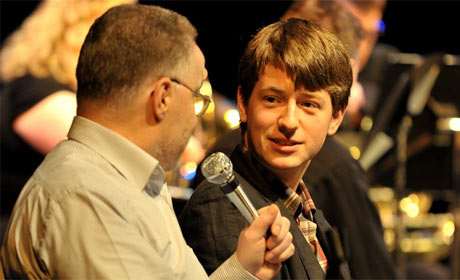RNCM - John Golland Young Composers Premieres
10-Feb-2009RNCM Festival of Brass
RNCM, Manchester
Saturday 31st January

A couple of mature heads: Paul Hindmarsh interviews winner Duncan Ward
Picture: Ian Clowes
More pictures at: http://www.pbase.com/troonly/0901_rncm_festival
With £500 up for grabs and the honour of writing a new work for the 2010 Festival, the John Golland Young Composer Premieres were a bit of a nap hand of musical delights on the Saturday morning.
Varying styles
The five aspiring (and even perspiring given that they had to face an interview with Paul Hindmarsh to explain the inspiration behind their works) young composer’s had written brass quintets of such varying styles that it was almost impossible to pick a clear winner from these first airings.
In the end the honour went to 19 year old Duncan Ward, whose amazingly mature ‘Pent–up Jopasso’ beat off the challenges from Mark Gotham, Benjamin Garfield, Liam Paterson and Ian Anderson.
Mature
Duncan also showed that he also has a frighteningly mature head on young shoulders too. He is currently the Composer in Residence for Coutts Bank (one of the few that hasn’t gone belly up and has Her Majesty as a current account holder) as well already writing a musical for Dartford Grammar School and a piece for the Philip Jones Memorial Concert from a BBC commission. That’s right – and he’s only 19.
His clever work took inspiration from the diverse characters of Scott Joplin and Pablo Picasso – hence ‘Jopasso’. It was a bit of ragtime written in musical cubism if you like, and fully deserved the award. It will be interesting to see what this very personable young man comes up with in time for next year – perhaps a piece based on the stripper Phyllis Diller and the painter Salvador Dali entitled ‘Dilly Dally’? He has the talent to do it for sure.
The RNCM quintet was on good form, and they had to be as they were faced with four other pieces from diverse febrile minds.
Beethoven paradigm
Mark Gotham’s ‘Becoming’ was described as being something of a ‘Beethoven Paradigm’ by the composer himself, and the rather ambiguous motifs interspersed by oblique silences was certainly different. Perhaps a bit too different for a traditional brass band audience at present, but nonetheless it was an interesting concept if a little on the incomprehensible side.
So too, Ben Garfield’s ‘(…) for tuba and brass quintet’ – a piece that explored tone colours and effects in a way that made a sound that at times resembled a conker rolling around a colander. This was ambitious thinking - complete with stage choreography with the tuba centre stage and the remaining quartet stage right.
Fragmented
Unfortunately it sounded just a touch too fragmented and a little pretentious (having the tuba walk off at the end of his last contribution was more than a touch of the latter) and we never quite got to understand what the title was all about either. Clever lad though.
Liam Paterson was the youngest of the composer’s on show and the Scotsman took his inspiration from Bela Bartok with his interesting exploration of a cityscape in ‘Urban Variations’.
This was the most easily understandable and transparent work on show – perhaps a little too simplistic at times, but there was ample evidence of an intuitive musical mind at work.
Foibles
The fourth piece came from the pen (or should that be computer these days) of Ian Anderson, a viola player with a curious interest in the foibles of the human character. His ‘Five States’ drew on diverse elements – from stammering and frivolity to euphoria, funk and something entitled ‘incubas’.
Not wishing to question his understanding of Freud too much, it was nonetheless a clever (and at times, witty) bit of writing, and although due to time constraints we didn’t hear the piece in its entirety, what we did hear was something very clearly realised – from the Arkwright inspired stammering to the Dumboesque elephantine frivolity and the weary melancholy of ‘incubas’.
A composer to watch out for – even if the RNCM psychologist would have a field day trying to interpret what he had just heard.
With Duncan Ward’s composition to close, an early morning glimpse into the future possibilities of brass band composing came to an end. Perhaps we will hear more of these young men in the years to come, perhaps not. But it was well worth taking the time to have done so.
Iwan Fox









